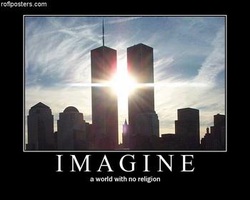
“Dominus Flevit.” Jesus wept. On a hill overlooking Jerusalem sits a small chapel built in the shape of a tear drop, called the Dominus Flevit chapel. It is said that from this spot Jesus wept over a dying Jerusalem. “If only you knew the time of your visitation,” he cries out. “If only you knew what makes for peace.” Jerusalem (the names means “city of peace”) still does not know what makes for peace. Friday, after the briefest of cease-fires, Hamas struck Israel with mortars and Israel responded with aircraft, tanks, and gunboats. Nearly 2000 people, mostly civilians, have been killed since July 1 in the Holy Land. “Israel started this war,” Tariq Ali said Friday in London.
Who did, in fact, start “this war?” Who started the war in Syria, or in Iraq, or in Egypt? Who started the war in Ukraine, in Nigeria, and in North Korea? Who started the deep divisions in our own country? The answer is: I did. I started this war, and I can end this war, with God’s help. “The line dividing good and evil cuts through the heart of every human being,” wrote Aleksandr Solzhenitsyn. Who started the war in your marriage, in your place of employment, or in your home? Someone once asked GK Chesterton to write an essay on “What’s wrong with the world,” and he wrote back two words: “I am.” The question is not who started this war, but who will end this war?
Terms of Peace
God stood at the gates of the city, offering terms of peace, and the people crucified him. These people were not essentially different from us in San Francisco. Like St. Peter, we deny the Lord, probably daily, at least in small ways. He who denies a smile to someone in his own house denies Christ; he who calls his brother a fool calls Christ a fool, and is liable to Gehenna. Jesus weeps over Jerusalem, and he weeps over San Francisco, even over those of us who attend the Latin Mass. This Gospel is meant for us.
Prayer
What then, brothers, must we do? We must insist on true religion, which is the only way to peace in the world. Man needs God. The first act of true religion is prayer. The entire Catechism of the Catholic Church leads to the fourth part, the art of prayer. First of all, pray the rosary, and pray it as a family. Fr. Driscoll and I, your two new priests, are trying to pray the rosary every day together, and it’s not easy. You can’t always pray the rosary with others, and it’s better to pray it alone than not at all, but try to pray it together at least a few times a week. Come to confession at least once a month, and try to make a Eucharistic holy hour once a week. And finally, assist at Mass as often as you can—only the Eucharist can save the world. The rosary, confession, and adoration prepare us for the Mass, and extend its graces. So: build your prayer life around Our Lady and the Holy Eucharist.
Charity
Once we have developed our interior life, we must then strengthen our brothers. We do that by practicing heartfelt charity—a simple smile, a helping hand, a listening ear. Not great things, but small, everyday things with great love. Washing a sink full of dirty dishes can express more charity than buying someone a new car. Finally, don’t forget that “instructing the ignorant,” “consoling the doubtful,” and “admonishing sinners” are works of mercy, necessary acts of charity. There is a lot of ignorance and doubt and sin in our city. We have a lot of work to do, work that we can only undertake after we have developed an intense interior life and learned heartfelt humility and patience with others. The city and the nation depend on us to promote true religion. I saw a full-page ad in the New York Times some time ago. It was a picture of the twin towers on a sunny day with the headline: “Imagine a world without religion.” But true religion did not take those towers down, and we already know what the world without religion looks like. It looks like the Nazi Holocaust and the Soviet Gulag. The world is moving away from true religion, and we must insist on its irreplaceable benefit to the common good.
In all things, we turn to Our Lady. We must learn to pray as she prayed, and learn to love as she loved. May she guide us in building a civilization of love.


 RSS Feed
RSS Feed